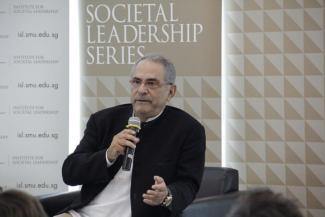
- Remarkable leader shared perspectives on ethical leadership in society
- Role model’s experiences in fighting for Timor-Leste’s independence for over 20 years, surviving an assassination attack and pardoning the would-be assassin and his accomplices, demonstrate qualities of outstanding leader
- Audience engaged on challenges and ways to stay on the ethical path
SMU was privileged to have the esteemed presence of Nobel Peace Laureate and former Timor-Leste President, Dr Jose Ramos-Horta, at SMU’s Societal Leadership Series Talk on 25 September 2015. Held at the Li Ka Shing Library, about 100 participants including dignitaries, businesses and the SMU community attended the session organised by SMU’s Institute for Societal Leadership.
Hosted and moderated by SMU Provost Professor Lily Kong, the talk and dialogue by Dr Ramos-Horta was focused on “Ethical Leadership: Challenges for Societal Leaders”. Ethics has been said to be at the heart of leadership, and the audience heard insights from and shared conversations with the trailblazer who epitomises the remarkable leader.

[Photo: At the talk hosted and moderated by SMU Provost Lily Kong, Dr Ramos-Horta shared his earnest perspectives of ethical leadership and challenges for societal leaders, through examples and anecdotes accumulated from his rich leadership experiences.]
Dr Ramos-Horta fought for the independence of his country for over 20 years, survived an assassination attack while he was Timor-Leste’s President, and pardoned the would-be assassin and his accomplices. He appealed for forgiveness and reconciliation, pleading to his people to forgo violence for the sake of the country.
How should leaders stay on the ethical path in the face of challenges today? What are the dilemmas they face? Having spent most of the 20 years of his fight for Timor Leste’s independence in exile as East Timor’s Resistance representative to the United Nations (UN), Dr Ramos-Horta talked about challenges he faced, as well as those of today’s leaders. He related perspectives on several fronts, through examples and anecdotes accumulated from his rich leadership experiences.
In illustrating the qualities of ethical leaders, he cited examples of indomitable great leaders in history whom he has profound admiration for, such as Mahatma Gandhi and Nelson Mandela. He candidly shared that he resolutely pursued to meet with Mr Mandela. He also paid tribute to Singapore’s founding Prime Minister, the late Mr Lee Kuan Yew, for exemplifying qualities of an outstanding ethical leader, building a successful nation and having immense foresight in binding and growing a multi-racial country through core policies such as anti-corruption and bilingual education.
Dr Ramos-Horta highlighted key qualities of ethical leaders, such as acceptance of responsibility for failure, being accessible to the people, honesty, humility and compassion. He also said that peace in today’s society are often not results of top-down leadership – it is often derived from leaders who humbly listen to those on the fringes of power struggles. He also remarked that arrogant leaders, no matter how competent they may be, will fall eventually. He then provided examples of ousted politicians in countries around the world.
Having been educated in the US, Europe and Asia on international law, human rights peace studies and political sciences, Dr Ramos-Horta’s advice on how ethical leadership will play important roles in education of the next generation and broad aspects of society benefitted the audience.

[Photo: The enthusiastic audience, including HE Antonio A. Morales, Philippine Ambassador to Singapore (holding microphone), asked more questions about Dr Ramos-Horta’s views and guiding principles on ethical leadership.]
Dr Ramos-Horta is currently Co-Chair of the International Commission on Multilateralism, whose mandate to be completed in late 2016, is to review the whole UN system, including the reform of the Security Council. He was elected as President of Timor-Leste in 2007, Prime Minister in 2006, and Foreign Minister in 2002 when the country gained independence. He is credited for securing a unanimous resolution affirming the right of the people of East Timor to self-determination.

[Photo: The talk held at the Li Ka Shing Library drew participants including dignitaries, businesses and the SMU community.]
For more information on SMU’s Institute for Societal Leadership, please refer to isl.smu.edu.sg